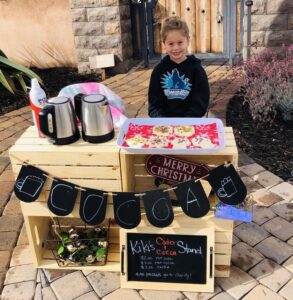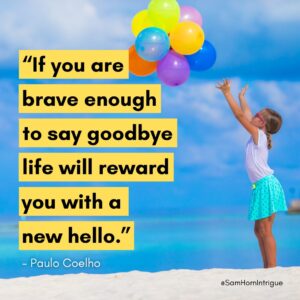Word-Of-the-Week #1029: Curiosity
April 25, 2024 by Susan Clarke · Comments Off on Word-Of-the-Week #1029: Curiosity
Curiosity – noticing and being drawn to things we find interesting; inquisitiveness.
How curious are you? Do you take time to actually notice your surroundings? How often are you drawn to things you find interesting or question?
This week features “The Power of Curiosity. Discover how cultivating an inquiring mind can help you lead a happier, healthier life,” by Todd Kashdan. He writes, “What do you want most in life? For the vast majority of us, the answer is “to be happy.” In a 2007 survey of more than 10,000 people from 48 countries published in Perspectives on Psychological Sciences, happiness was viewed as more important than success, intelligence, knowledge, maturity, wisdom, relationships, wealth and meaning in life.
Happiness is a good thing. Yet, both in my professional research and in my personal experience, I’ve observed that when we focus solely on what we think will make us happy, we can lose track of what actually does.
In 2007 the Princeton economist Alan Krueger, Nobel Laureate Daniel Kahneman and their colleagues published a paper called “Are We Having More Fun Yet?” ( I REALLY like the title!) They posed this question: Have the social progress, economic prosperity and technological advancements of the past 50 years changed the quality of our lives? Have these new opportunities allowed us to spend more time doing what we care about most, thus increasing our satisfaction and meaning in life?
For most of us, the answer is no. The majority of Americans spend less than 20 percent of each day doing what could be termed very engaging, enjoyable and meaningful activities (such as talking with close friends, bonding with loved ones, creating, playing, or pursuing a spiritual practice). Instead, most of our time and energy are spent either engaged in unsatisfying work activities and chores (commuting, standing in line at the post office, fixing broken appliances), or decompressing in ways that bring neither joy nor challenge (watching TV, snacking or just “doing nothing”).
It doesn’t have to be this way, though — if we’re willing to shake up our pursuit of happiness by introducing some elements of surprise.
One of the most reliable and overlooked keys to happiness is cultivating and exercising our innate sense of curiosity. That’s because curiosity — a state of active interest or genuinely wanting to know more about something — creates an openness to unfamiliar experiences, laying the groundwork for greater opportunities to experience discovery, joy and delight.
Curiosity is something that can be nurtured and developed. With practice, we can harness the power of curiosity to transform everyday tasks into interesting and enjoyable experiences. We can also use curiosity to intentionally create wonder, intrigue and play out of almost any situation or interaction we encounter.
The Power of Curiosity
Curiosity, at its core, is all about noticing and being drawn to things we find interesting. It’s about recognizing and seizing the pleasures that novel experiences offer us, and finding novelty and meaning even in experiences that are familiar.
When we are curious, we see things differently; we use our powers of observation more fully. We sense what is happening in the present moment, taking note of what is, regardless of what it looked like before or what we might have expected it to be.
We feel alive and engaged, more capable of embracing opportunities, making connections, and experiencing moments of insight and meaning — all of which provide the foundation for a rich, aware and satisfying life experience.
I don’t know about you, but I LOVE the joy & delight of unfamiliar experiences & surprises! This week focus on having more curiosity. What genuinely interests you? What would you like to know more about? Are you open to having unfamiliar experiences?
I LOVE feedback! Join my Facebook community on my FUN-damentals Fan Page.
Word-Of-the-Week #1028: Fortunate
April 18, 2024 by Susan Clarke · Comments Off on Word-Of-the-Week #1028: Fortunate
Fortunate – having more advantages than other people.
Do you believe you should help others that are less fortunate then you? When was the last time you did that?
This week I felt like rerunning “Kindergartener pays off lunch money owed by classmates. Five-year-old Katelynn Hardee of Vista held a cocoa and cookies fundraiser,” by Deborah Sullivan Brennan. I feel it’s important to realize and remember how fortunate we truly are!
“After a Vista kindergartener learned of hardships faced by some of her classmates, she sold hot cocoa and cookies to pay off the lunch money they owed.
Katelynn Hardee, 5, held a hot cocoa stand in front of her home Sunday, aiming to help end hunger with proceeds from the treats.
She wanted to make sure that other students “can have a snack and lunch,” she said. “If they don’t, their tummies grumble.”
Her goodies, along with some handmade artwork, brought in $78, which helped square up lunch accounts for 123 other students with small balances, said Jamie Phillips, director of child nutrition services for Vista Unified School District.
“It’s amazing to see a 5-year-old do a fundraiser,” Phillips said.
Katelynn, a student at Breeze Hill Elementary School, loves art, cooking, and asking questions, her mother Karina Hardee said. So when she heard another mother discuss her difficulty covering the bill for the after-school program, Katelynn asked her mom about it.
“I tried to explain that we need to be kind and give back to others who are not as fortunate,” Karina Hardee said.
Katelynn had done a lemonade stand over the summer, so she decided to sell hot cocoa this time, and donate the money to help kids who couldn’t pay for lunches. She and her mom mixed up chocolate and milk, and baked sugar cookies shaped like snowmen, snowflakes, presents and Christmas trees.
“I decorated them with icing and gumball toppings,” Katelynn said.
Friends, neighbors and passers-by stopped for snacks, and Katelynn made $48. She raised another $30 with artwork she is making for a family friend. Phillips used that donation to clear the balances on 123 lunch accounts.
That act of charity “is not typical of a 5-year-old, but for Katelynn I could see that,” her teacher Rachel Ellis said. “She’s very mature for her age.”
Over 1,000 students in the district have negative balances ranging from less than a dollar to $10 or more, Phillips said. In Vista, nearly 65 percent of students qualify for free and reduced lunches based on their family income. Some other students might be eligible, but did not submit the application in time, he said. In other cases, families have income that is too high to qualify for the meal program, but not quite enough to make ends meet.
“The cost of living here is so much higher” than other communities, he said. “You could not qualify for free and reduced meals, and could still not be at a livable income.”
Schools still provide meals even when students owe money, but the nutrition department sends notices reminding their families to pay. If they don’t pay by the end of the year, he said, the balance doesn’t carry over. Instead, the school district reimburses the nutrition department from the general fund. But that diverts funds from other programs, and the district is currently facing budget deficits.
Phillips said anyone can donate to help pay down the lunch balances and some seniors contribute the money left over in their own lunch accounts when they graduate. Katelynn’s fundraiser has already inspired more giving; another donor just paid to clear all the lunch balances at Major General Raymond Murray High School, Phillips said.
“It’s really inspiring,” Ellis said. “When I told my class, they said, ‘We can do that? I want to do a lemonade stand.’”
Katelynn thinks her donation probably made her classmates happy, and said she wants to do more lemonade and cocoa stands in the future.”
This week’s focus is on being fortunate. Do you appreciate all that you have? Are you more generous during the holiday season? If a 5-year-old can make a difference don’t you think you can do something to help those that are less fortunate than you?
I LOVE feedback! Join my Facebook community on my FUN-damentals Fan Page.
Word-Of-the-Week #1027: Trust
April 11, 2024 by Susan Clarke · Comments Off on Word-Of-the-Week #1027: Trust
Trust – firm reliance on the integrity, ability, or character of a person.
Would you agree that you tend to trust people that you like? Do you think you could win someone’s trust without speaking to them? How often do you smile during the course of your day?
Henry DeVries, assistant dean for external affairs UC San Diego, featured another great UT article titled, “Five Ways to Win Someone’s Trust Without Speaking.” He writes, “Trust is at the core of every type of human transaction, whether it’s in business, family matters, or with a romantic partner. If you want to get hired, you need to inspire trust.
“The best way to get someone to like you is to win their trust,” says author Marvin Brown. “Like and trust are first cousins. We generally don’t like people we don’t trust. And we tend to trust people we do like.”
Brown is an expert in business communication strategies and the author of a great new book “How to Meet and Talk to Anyone, Anywhere, Anytime: Simple Strategies for Great Conversations.”
Here are a few tips from Brown for using body language to instill trust right away.
- Give a heartfelt, teeth- showing smile. This says to the other person, “You can relax and feel safe with me.” Women are generally better at this than men. To practice, pretend you’ve just bumped into a great friend you haven’t seen in years, or pretend you’ve been introduced to a famous celebrity you’ve long admired. Reproduce that smile, and for a few days practice using it when you greet people. Pay attention to its effect on them.
- Add a smile when delivering encouragement. When telling someone you’re glad to meet them, or when praising, complimenting, or congratulation them, always accompany that positive message with a smile that externalizes your inner feelings of joy or genuine warmth and affection for the person. It magnifies your message and makes it more memorable.
- Use a handshake to intensify the moment. A strong handshake is absolutely essential, no matter what your gender. But this underused gesture is for more than meeting someone the first time. A handshake when ending a conversation delivers a physical punctuation mark that makes your encounter more memorable.
- Add an extra second of eye contact when shaking hands. Always look the other person in the eyes for a full second, while smiling, before letting go of your hand. This extra moment has a tremendous impact; it makes you seem charismatic.
- When listening, complete the “communication circuit” with your eyes. Give face-to-face attention and make eye contact with the person who is speaking. This simple gesture completes the invisible connection between speaker and listener.
“Experts say it takes anywhere from five seconds to five minutes to make a first impression,” says Brown. “Either way, the process begins immediately — even before you speak. That’s because you’re already communicating — using body language.”
This week’s focus is on trust. How often do you shake hands at the end of a conversation? Are you good at making and keeping eye contact with your customers, guests, members or clients? Are you a good listener?
I LOVE feedback! Join my Facebook community on my FUN-damentals Fan Page.
Word-Of-the-Week #1026: Emergency
April 4, 2024 by Susan Clarke · Comments Off on Word-Of-the-Week #1026: Emergency
Emergency – a sudden, urgent, usu. unexpected occurrence requiring immediate action.
How comfortable are you dealing with an emergency? Can you stay calm and focused in an intense situation?
Steve Strauss, author of STEVE’S 3-MINUTE COACHING, once again has great insight to share.
Principle: Dealing With Emergencies
(Principles are basic truths that, when applied, cause success to come to you easier and quicker.)
Talking with a seatmate during a recent airplane trip we discussed his history which included years as a paramedic. A phrase just slipped out of him about how he stayed calm and focused in intense situations.
Each event he would remind himself, “This is not my emergency.” That frame of reference supported him to remain professional and caring in the middle of emotion-filled disasters.
Sometimes he physically grounded/anchored the phrase by touching the door-frame as he entered a home or office or as he arrived at the mangled body of a vehicle.
Be present? Of course. Do what you’re there to do? Yes. Take on the emotional energy of the participants? Not useful.
Coaching Point: Can you recall an emotion-based situation where reciting “This is not MY emergency” would have helped you stay focused and have performed with a clearer head and heart?
See all past issues and subscribe here Steve’s 3-Minute Coaching
— Copyright 2024 Steve Straus. All rights reserved. —
This week’s focus is about dealing with an emergency. I have found that people who don’t plan or are impatient create what I call “a fire drill.” They expect people to help at the drop of a hat. And that creates a sudden, urgent situation requiring immediate action. How would it feel for you to say, “This is not my emergency?”
I LOVE feedback! Join my Facebook community on my FUN-damentals Fan Page.
Word-Of-the-Week #1025: Change
March 28, 2024 by Susan Clarke · Comments Off on Word-Of-the-Week #1025: Change
Change – the action of making something different.
Do you find change difficult or stressful? Or do you love the excitement of creating or experiencing something new?
This week features more sage wisdom from Sam Horn’s newsletter.
ANECDOTE
Carol worked in DC and commuted 2-3 hours EVERY DAY.
Being away from home for 13+ hours a day made her feel especially guilty because she wasn’t able to play with her dog, Aussie.
She dropped Aussie off at a doggie day care every morning, but he’d developed separation anxiety and he “cried” – which made her feel even more guilty.
When she got home at night, she was too tired to play with him – and on weekends, she had chores and wanted to catch up on sleep or go out with friends/coworkers.
After listening to her story, I made a drastic suggestion. I said, “I know you love Aussie AND is there someone nearby who would love him and give you “visitation rights?”
She was shocked that I’d even suggest it… But the more she thought about it, the more she realized she was working hard to pay for a house and dog she loved, but never had time or energy to enjoy either of them.
Carol realized things were going to stay the same – unless she made a change.
So, she asked her son, who lived nearby, if he might be interested in Aussie. He is a marathoner and quickly agreed because he welcomed the companionship on his training runs.
The best part is – now she gets to see both of them whenever she wants!
Plus, since she no longer needed a house with a big backyard, she sold her home and moved closer to work.
Now that she doesn’t have to commute, she has 2-3 extra hours every day to go to the gym and hang out with coworkers.
She’s fit, feeling better about herself, and finally has a social life… All because she had the courage to honestly assess her life and make changes that had a catalytic ripple effect.
ACTION
- How about you? Do you like your life the way it is?
If so, good for you! If not, what is ONE THING you could change that could have a catalytic ripple effect?
- What STUFF might holding you back or weighing you down?
And when I say STUFF, I don’t just mean possessions – I mean commitments.
Be HONEST, because if we don’t admit it, we can’t address it.
This week is all about change. Change is inevitable, growth is optional. That pretty sums up life wouldn’t you say? How would it feel to embrace change knowing that YOU CAN AND WILL get through it? And how about the added bonus of improving your life too?
I LOVE feedback! Join my Facebook community on my FUN-damentals Fan Page.






